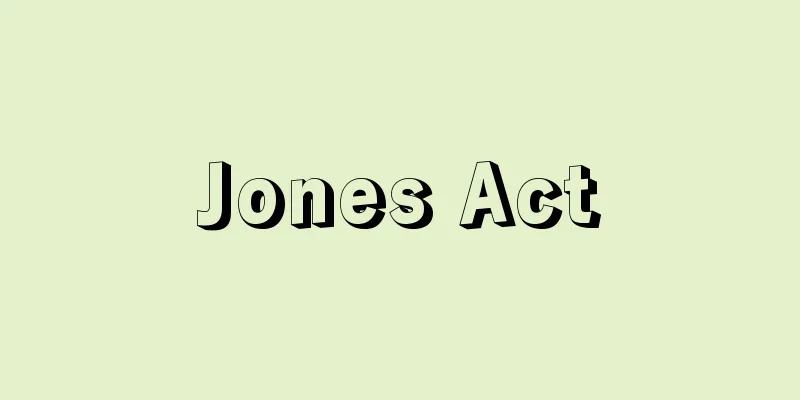Jones Act

|
The Philippine Autonomy Act was passed by the US Congress on August 29, 1916. It is commonly known as the Jones Act, named after its proposer, Senator William A. Jones. In this preamble, the US formally promised the future independence of the Philippines for the first time. Most importantly, legislative power was given to the Filipino people, resulting in the establishment of a Filipino Senate and House of Representatives. However, executive power was still held by the American Governor-General, who retained veto power over laws passed by the Philippine Assembly. Source: Heibonsha World Encyclopedia, 2nd Edition Information |
|
1916年8月29日にアメリカ議会を通過したフィリピン自治法。一般には提案者ジョーンズWilliam A.Jones議員の名前をとってジョーンズ法で知られている。この前文のなかでアメリカは初めて公式に将来のフィリピン独立を約束した。最も重要な点は,立法権がフィリピン人に与えられたことであり,この結果,フィリピン人から成る上院・下院が設置された。だが,行政権はいぜんとしてアメリカ人総督が保持し,総督はフィリピン議会を通過した法律に対し拒否権を保持した。
出典 株式会社平凡社世界大百科事典 第2版について 情報 |
<<: Johns Hopkins University - Johns Hopkins University
>>: Johnston, Joseph Eggleston
Recommend
Karasu-gane
〘 noun 〙 A type of usury in the Edo period. Money ...
Senjutsu - Senjutsu
〘Noun〙 The arts used by immortals. The arts of imm...
Mesopithecus
...The first capuchin monkey, Dolichocebus , was ...
Isionna - Isionna
...A woman who cannot have children. Also called ...
Türkmen (English spelling)
… [Vestiges of nomadic culture] It is believed th...
Exeter
It is the capital of Devon County in southwest Eng...
Speedy trial - jinsokunasaiban (English spelling) speedy trial
It refers to a trial in which the proceedings are ...
Severnoe obshchestvo (English spelling)
...There were also differences of opinion as to w...
Scythopolis
…It flourished as a key point of north-south trad...
Block construction - Building of concrete block masonry construction
A building with walls made of stacked concrete blo...
Leaf moss - bryophyte
A general term for mosses that grow on living leav...
Serge - Sage (English spelling)
It is one of the most widely used practical fabri...
Head temple - Omotoyama
…In the Edo period, it was a general term for pro...
flauto traverso (English spelling) flautotraverso
…As a result of these efforts, the flute was reco...
Samrong Sen
A prehistoric shell midden site in Cambodia. It is...









